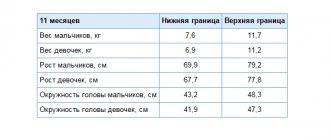At 11 months, a child shows greater physical activity and curiosity, so it becomes increasingly difficult for parents to monitor their child, who strives to explore everything, stick his fingers everywhere and taste everything that was previously inaccessible to him. Many young parents are concerned about the following questions: what should a child be able to do at 11 months, what are the generally accepted norms for his development, and is it worth worrying about any possible deviations in the development of their child.
Many children at this age show great energy and playfulness, while they need constant attention and control. After all, they really want to learn more about the world around them, and the possibilities of an 11-month-old baby boy are still limited, so he regularly has to resort to the help of his parents. Being 11 months has its advantages, because the period of infantile whims has passed, and there is still time before the first age-related crises manifest themselves, so for now you can calmly enjoy the first successes and achievements of your baby.
How does physical development occur at 11 months?
At 11 months, the child gains a little weight - about 400 grams. During this period, his height increases by one and a half to two centimeters. By the age of 11 months, the difference between the physical development of children of different sexes is already noticeable. So, a boy weighs on average about 10 kilograms, they are 1-2 centimeters taller than girls.
At the age of 11 months, each individual child acquires his own individual skills and abilities. One child is already able to move independently, without assistance, he goes up and down the stairs, while another child does not even crawl yet, prefers to spend most of his time in the arms of adults or is focused on an interesting game in the playpen. Such phenomena are normal, so for parents who are beginning to worry about the baby’s development, only the basic skills that the little one has mastered at his age should serve as a guide.
These skills and abilities include:
- Ability to sit independently and sit down without support.
- The child tries to crawl, stand up and walk while holding onto support.
At the age of 11 months, a child should be able to walk with the support of his mother, coordinate his movements, children no longer fall and bump into various objects so often, they can hold a toy with both hands, transferring it from one handle to another.
A child at 11 months is active, inquisitive and inquisitive; he is constantly in search of new experiences and exploring the world. Therefore, parents should be wary if the child does not try to get off his hands or get out of the crib in order to actively explore the world around him.
How to understand that a child is developmentally delayed: common problems and ways to solve them
If you are worried that your baby is delayed in development, but are not sure that the time has come to contact specialized doctors, this list of characteristics will help you decide. You should worry if at 11 months your child:
- does not sit independently or sits only with support;
- does not crawl or crawls only on its bellies;
- does not try to rise to a standing position;
- cannot stand with support for even a few seconds;
- does not respond to the name and does not make any sounds at all;
- does not show emotions, does not distinguish the tone of speech of parents;
How does neuropsychic development occur at 11 months?
At 11 months, the majority of babies are in a good mood and are not very capricious. But no less important is maintaining the correct daily routine - the child should eat about 5 times a day and sleep 1 time during the day. At the end of the first year of life, a child can make his parents happy with his first words.
At the age of 11 months, a child should already be able to do a lot - fold a pyramid, assemble towers from cubes, eat on his own, roll a ball and a car away from him. At this age, the child already chooses his favorite toys, does not play with everyone, but gives preference to some toys. A child at 11 months is already trying to play role-playing games. It is recommended to introduce a child at this age to drawing with finger paints. At this age, the baby’s “drawings” already acquire some meaning; he doesn’t just aimlessly move his finger across the paper, but tries to depict, for example, the sun.
Many children during this period already know how to pronounce words, sounds, phrases; such standards are mandatory - 11 words by the end of the first year of life. It is interesting that, having learned to pronounce words, for example, mother, the baby uses this word to designate not only the mother herself, but also her clothes, bathing the baby, since only the mother bathes him. Sometimes a child may, having mastered a new word, forget it a few days later and lose interest in it. There is no need to worry about this; after a while, the child will begin to use more and more new words.
Attention! During the period of active speech development at 11 months, the style of communication with the baby is important. It is recommended to speak to the child only in correct, clear words, without affectionate diminutive suffixes and lisps. This manner of communication can become a brake on the child’s speech development; he will subsequently distort words.
To speed up speech development, it is recommended to talk to your baby and read to him as often as possible; children especially love bright books with pictures.
Gymnastics with a baby
You can do general developmental gymnastics with a child of 11 months every day or every other day. A set of exercises will help your baby learn to control his body from infancy. Properly performed gymnastics actively develops and strengthens the child’s body.
Exercise "Boxing"
Give your child plastic or rubber rings for easy gripping. Holding them, straighten and bend the child's arms. It is necessary to perform 5-6 times with each hand.
Exercise "Wheelbarrow"
The child lies on his stomach. Lift him up and support him only by his hips - let the baby try to lean only on his hands. Place a toy in front of your baby and encourage your baby to move his arms to get closer to it.
Bend exercise
Place the child with his back to you on a hard surface (for example, a table). Use the palm of your left hand to hold his knees so that they do not bend, and place the palm of your right hand on the baby’s stomach. Place an object/toy that attracts him in front of the baby and ask: “Bend over and take out the cube (ball, car).” It is important to ensure that the child bends over without squatting.
Important! This exercise is designed for children who can already stand without support.
What should a child be able to do at 11 months?
According to children's specialists, an eleven-month-old child can:
- Sitting down and standing up independently, without support, walking can be done with adult support.
- Drink independently from a cup or sippy cup, eat with a spoon.
- The child must be aware of the purposes of household items, try and learn to use them. For example, if a mother gives a child a cup, he will try to drink from it; a comb will try to comb his hair with it.
- The baby is able to hold the toy with his fingers, not his palm.
- Can assemble pyramid rings, stack cubes on top of each other, open and close boxes and cabinets.
- Show animals and household items in images.
- The child must respond when addressed and understand that it is his name that is being called.
- Carry out small tasks asked by adults (give me a ball, show me where your eye is).
- Know where household items are, where his room is, where the kitchen is.
- Say a few words and give a name to your actions and the actions of others.
"Dad" or "Mom"? The child began to speak.
One fine day, a son or daughter greets their father entering the room with a joyful exclamation: “Dad!” The father, of course, is happy and proud; Mom, although happy, is somewhat upset: why wasn’t the word addressed to her first?
This happens often, and not at all because the child loves his dad more. At the risk of slightly injuring the father's pride, let's assume that it is simply easier for a baby to pronounce the sound “p” than “m.” And in general, at first both “pa-pa” and “ma-ma” meant no more to him than “gaga” or “la-la.” And only thanks to the fact that the child heard every now and then: “Go to daddy”, “Wave your hand to daddy” - the sound was connected with the idea, the understanding came that this big, pleasant person should be called “dad”.
So the mother, talking with the child, herself prepared the father's primacy. And she did great! Now she herself won’t have long to wait for the desired treatment. Moreover, “mother” becomes a very polysemantic word for the child, containing a whole range of feelings, considerations and impressions. This includes “Mom has come”, and “Where is Mom?”, and “I feel bad without Mom.” Don’t be surprised if one day, looking at the usual cup or at his blouse, he also says: “Mom.” Understand this: “Mom gives me juice from this cup,” “Mom puts on this blouse for me.”
When talking to your child, naming objects and explaining your actions, invite him to repeat simple short words after you. If he asks for something, extending his hand to the desired object, do not rush to fulfill his request, but teach: “Say: “Give!”
The baby still loves his first games: magpie-crow, okay, hide and seek. He can already be interested in a simple plot game: put the dog to bed, feed the bear, rock Lala... In the playpen he often stands holding the barrier with one hand, and sometimes something like this happens: he will bend down, take a toy from the bottom of the playpen and, carried away, begin to twirl it with both hands now. He won’t even notice that he’s left the support!
Until now, sitting in his mother’s arms, he had not wished for anything better. Now more and more often he begins to arch impatiently and ask to sit on the floor: he really wants to walk! First you have to hold it under your arms for greater stability, then by both hands. Well, a little more, a little more... Squat down in front of him, beckon him to you, and he, slightly leaning forward, spreading his legs wide (this makes it easier to maintain balance), with an expression of determination, delight and fear, will take a few steps and fall into your arms. Who is happier at this moment - he or you?
Difference between the sexes
By the end of the eleventh month, a strong difference is visible between boys and girls. It manifests itself both in the physical development and behavior habits of children. Changes become very noticeable when a child chooses toys and games. Little ones prefer soft toys, dolls, and strollers. They feed the dolls, rock them, the girls really love to put bright beads and bracelets on themselves, and ask their mother to paint their lips too.
For boys, active noisy games are becoming popular. They prefer cars and balls. There is no characteristic plot in their games; they imitate, act, and make noise. Differences also become noticeable when in contact with other children of the same age; for boys, it is preferable to play with their peers, they can approach them, touch them, and sometimes even fight. And girls love to play with older children more; it is often more difficult for a girl to establish communication with another child. But all these manifestations are conventional and generally accepted. Each child is individual, and his development depends only on his individual characteristics.
Content
It is quite possible that this month your baby will delight you with his first words. Usually they are vaguely similar to adult language, but mother unmistakably guesses their meaning. A feature of a child’s first speech is also the polysemy of words - depending on the intonation, the same word, for example denoting a hand, can mean either a request to be held in the arms or simply a comment when looking at one’s own hands.
As a rule, the mother serves as a “translator” for her baby - other adults may not understand him until his speech becomes correct (and this will take a lot of time - from six months to several years).
Help your young “speaker” develop his speech apparatus. To do this, often show pictures of animals and “voice” them. Very quickly the baby will learn all these “meow-meow”, “aw-aw”, “pee-pee”, etc. At first the child will call animals with these onomatopoeic interjections
Educational games for 11 month old babies
Educational games for children 11 months old
Playing for a small child is of great importance in his development. Many educational games and activities for the baby were described above. Even just being in the sandbox with toys is also good for the baby’s psyche and mind. Here are some more educational games for 11 month olds:
Educational games for 11 month old babies
What should a child be able to do at 11 months?
- Walk against a support or holding onto an adult with both hands
- Climb and descend stairs on all fours
- Drink from a cup with two handles
- Understand simple phrases from mother addressed to him
- Fulfill simple requests: show your nose, give me a pen, take a doll, etc.
- Trying to repeat onomatopoeic interjections after mom
- Perform communicative gestures: wave your hand when saying goodbye, nod your head when agreeing and shake your head when disagreeing, etc.
Tips for parents on child development
The psychological closeness of mother and child largely depends on the amount of time spent in close proximity to each other. Take your baby in your arms as often as possible, hug him, talk to him, praise him. The child really needs this even when he can walk and crawl on his own.
Continue to help your child develop speech. Catch every word, repeat sounds and syllables with him, try to understand what your baby wants to say. Be sure to use a variety of speech games.
The development of a baby's speech is directly related to the development of fine motor skills. In order for a child to speak clearly, understandably and on time, it is necessary to conduct daily activities and games that will develop the activity of the fingers.
Continue to pay attention to the physical development of the baby, give him massage and perform gymnastic exercises appropriate for this age. If a child prefers to crawl instead of walking, you should not force him to stand on his feet. Everything will come in due time.
Try to think in advance about how to make a significant event in the family – your baby’s birthday – unforgettable. One year is an important stage in the life of a baby and his parents. Think about how to decorate the room, what kind of cake to make, create a menu and invite little guests. For a child, this day should be interesting, fun and memorable.
Games for speech development
- Use Doman cards on various topics and show them to your child every day.
- Play is the best way to develop speech and expand your vocabulary. Be sure to pronounce all your actions in the game and the names of objects. It is good if the child tries to repeat some words or sounds with you. Remember that learning must begin with short nouns.
- Play the game “What is this?” with your baby. or “Who is this?” To do this, you will need a small box in which you need to place various household items familiar to the baby or favorite toys. Taking them out one by one, ask who it is and clearly pronounce the word - the answer.
- Read fairy tales to your baby, look through bright colorful pictures in a book together, name objects and point at them with a child’s finger.
- For the development of the children's jaw apparatus, it is recommended to give the child carrots or bread crumbs.
Games for developing fine motor skills
- Children love to “paint” on the small grains with their fingers. To do this, you need to pour semolina or flour into a shallow tray or plate and move the child’s finger, drawing a sun, fish, flower, etc. In the future, let the baby draw his own pictures.
- Fine motor skills are developed by drawing with thin pencils, crayons or pastels, as well as by sculpting with plasticine (or specially prepared salt dough). It is not advisable to use thick pencils and felt-tip pens. Using plasticine, you can teach your child to roll out a sausage, cut it into small pieces and form them into small balls.
- Using small plastic molds (sand cups), the baby can pour seeds or oatmeal from one dish to another. This perfectly develops coordination of movements and strengthens the arm muscles. The same game - activity can be repeated during evening swimming. Children love to pour water or fill a container with it.
- Show your child how to string plastic rings onto his wrist and then remove them. It is possible for the baby to put the rings on the adult’s hand.
Communication and play with an 11-month-old baby
Now not only is he interested in you as an interlocutor - the baby himself can entertain you. He happily demonstrates a wide arsenal of pantomimes that you have learned with him (waving a hand goodbye, depicting flying birds or airplanes, showing parts of the face and body on himself, on his mother, on a doll, etc.). He strives to bring joy to your face. Therefore, generously reward all his performances, and in general praise him more often - this is perhaps the most important advice for the mother of an 11-month-old baby.
Having received approval, the baby is ready to endlessly repeat the action that caused it. This way you motivate your child to learn everyday skills from you and learn from life experience. Therefore, after the first independent attempt to feed the doll with a toy spoon and after approval from the mother, the baby will try with redoubled zeal to master the spoon when he eats himself. The same is true for learning to use a toothbrush, taking off slippers when getting on sofas, throwing apple cores into the trash bin, etc. That is, it’s enough to praise, and the baby will persistently learn to do everything correctly - it’s so nice to receive recognition from the person closest to you.
In this way, it is best to comprehend the necessary wisdom of life - with pleasure, and not through coercion. Therefore, we repeat once again: praise more often, do not be afraid, at this age it is impossible to “over-praise”, as well as “caress” a child.
A child of 1 year and 11 months is not particularly friendly towards his peers - at this age all children are self-centered, and therefore are not capable of strong friendships. The very concept of “friendship” for children comes down to simple communication and unobtrusive play. At this time, a feeling of sympathy for one of the comrades may develop. As a rule, the object of sympathy has a similar temperament and interests. True friendship will come only after a few years, when the child is capable of more meaningful interactive communication.
Just a couple of weeks ago, your little one was demonstrating independence and refusing to sit in your arms even for a couple of minutes, but now it’s starting to demand that you hug it. Couldn't a child at 1 year and 11 months give up independence? In fact, moving around the apartment, performing hygiene procedures, and getting dressed has become a routine task for the baby, rather than learning about the world. But the child does not want constancy; he protests against coercion. At this age, the toddler is not ready for the independence that has fallen on him, so he expects protection and support from you. Of course, he is able to walk to his crib and go to bed, but before that he wants to feel the warmth of his mother’s hugs.
How should parents act in such situations? - find a reasonable compromise. Don’t stop pushing your child to act independently, give him space to play, give him instructions, and only after that encourage him with kisses and hugs. The child will understand that he is part of your life and is still close to you. Very soon he will become physically strong and resilient, he will run and frolic, you will still miss his requests to sit in your arms.
As for the intellectual development of a child at 1 year and 11 months, the child begins to communicate with people around him using simple structures that consist of several words. These could be requests like “give me a drink” or “I want to go for a walk.” Kids can name parts of the human body and the names of familiar people. At this age, like little parrots, they will copy everything they hear. That’s why adults should control the speech they make, otherwise in the future they may hear something unpleasant from the little one. A child of 1 year and 11 months may well make grammatical errors: he may well say “go for a walk” instead of “go for a walk,” but the main thing is that you understand his request. At this time, the child speaks about himself in the third person: for example, “Katya wants to eat.” Gradually, speech will become more perfect and expressive. The baby will be able to pronounce longer and more emotional sentences. By the age of about three years, a child’s vocabulary will already have more than 300 words. Time will pass - and your baby will be able to express her thoughts and feelings not only with a set of gestures and a few words, but with completely coherent text.
The time for one-ingredient purees is over. Now the mother is free to experiment: there are many foods on the list of allowed foods that can now be mixed, and besides, the baby is already accustomed to the denser consistency of the dishes. So, what should you feed your baby at 11 months?
Baby's daily routine at eleven months
By 11 months, the baby’s daily routine is already fully formed, so if you should try to adjust it, then do it very gently - a sudden change in the routine can lead to stress in the baby. A child’s biological clock makes it possible to determine whether your little “lark” or “night owl” is growing up.
The need for sleep at this age is 14 hours a day. Of these, the child sleeps 10 hours at night, and during the day sleep lasts 1-2 hours. You need to go for a walk with your 11-month-old baby twice a day, organizing it so that the child spends part of the walk actively, and part of it sleeps on the street.
This is what a day looks like for an 11-month-old baby:
| 8.00 | Getting up, hygiene procedures, breakfast |
| 9.00 | Gymnastics, massage, educational games with mom |
| 11.00 | First walk in the fresh air or balcony, sleep |
| 13.00 | Dinner |
| 14.00 | Daytime nap |
| 16.30 | Afternoon snack |
| 17.00 | Games, listening to children's songs, reading books, |
| 18.00 | Second walk |
| 19.30 | Dinner, bath or shower, bedtime story, getting ready for bed |
| 21.00 | Night sleep |
Note! It is easier for parents to adapt to the current regime of their child; this will save a lot of time and effort without torturing the baby’s fragile nervous system.
What to feed
The daily menu of an 11-month-old child ideally includes products from all the main groups of the food pyramid. Namely:
- Cereals . The baby can already eat buckwheat, rice, corn, oatmeal, wheat and millet porridge. The approximate daily intake for an eleven-month-old baby is 200 grams.
- Vegetables . Zucchini, broccoli, cauliflower and white cabbage, carrots, pumpkin, potatoes, beets, tomatoes, onions. A child can eat about 150 grams of vegetable dishes per day.
- Meat and fish . For a baby, it is better to cook rabbit, turkey, chicken and beef. The daily norm is 40-50 grams of boiled meat puree or 80-100 grams of meat “in a jar.” As a meat portion, you can sometimes give dishes made from offal: tongue, liver or heart. It’s good to have a “fish day” a couple of times a week. A serving of fish can now be 30-60 grams. Among those allowed for baby food: marine - flounder, cod and pollock; river fish - hake, carp and river perch.
- Dairy products . It is recommended to give a child no more than 50 grams of cottage cheese at this age. Fermented milk drink - kefir, biokefir, biolact, yogurt - about 200 grams.
- Fruits . Among the friendliest to the baby’s digestive system are apples, pears, bananas, peaches, apricots, plums, and currants (white, black and red). The norm for fruit puree is about 90-100 grams.
- Egg . A couple of times a week it is useful to give your baby half a chicken yolk, or a whole quail. To do this, eggs should be hard-boiled. Short heat treatment with the “soft boiled” or “in a bag” options does not destroy the causative agents of salmonellosis.
- Oil . Vegetable oil goes well with vegetable dishes. The daily norm for a baby at 11 months is 6 grams. Cream makes porridge tastier; 5 grams per day is enough for a child.
- Cookie . An eleven-month-old baby can be pampered with special baby cookies. But you shouldn’t get carried away - two pieces a day are enough.
An 11 month old child: what should be the number of teeth?
An 11-month-old child: teeth
The baby’s teeth begin to appear during intrauterine development. If the chewing apparatus is developed normally, then the newborn will have 20 milk buds and 16 molar buds . What should be the number of teeth at 11 months ? Here is the answer:
- By this age, the child already has 6-8 milk teeth .
- At the 11th month, the lateral incisors are already emerging.
The teeth are cut alternately in a certain sequence. But there are exceptions when the baby has them out of sequence. This is normal and depends on the developmental characteristics of your baby.
When to feed
It’s not always possible to follow a strict routine with kids, but it’s worth trying. Children who eat at regular intervals—with a maximum error of 30 minutes—have better appetite and fewer problems digesting food.
At 11 months, it is recommended to feed a child five times a day, leaving four hours between meals. Immediately after sleep and at night, the baby still receives breast milk or an adapted milk formula.
A classic breakfast is porridge, cottage cheese, and sometimes an egg yolk.
For lunch, they usually serve dishes made from vegetables and meat (fish or offal). But a meat portion also goes well with a cereal side dish. Then vegetables can be given for breakfast or dinner.
Fruit puree and any fermented milk drink are also suitable for dinner.
Content:
- Physical development of a child Differences between boys and girls
- Physical abilities
- What can an eleven month old baby do?
What to drink
Plain water is what a child needs to maintain water balance. You can buy bottled baby water or use boiled tap water. In second place are compotes made from berries, fruits or vegetables familiar to the baby. Preferably without sugar.
You can also prepare thin jelly from berries and fruits familiar to the baby. The drink improves digestion, but since it is very high in calories, it is better not to give it to overweight children.
You should not get carried away with juices, although according to the norms you are allowed to drink 60-80 ml of them every day. They contain a lot of sugar and this is a disaster for delicate baby teeth. Juices are also rich in organic acids, which irritate the mucous membranes of the gastrointestinal tract.
Let's eat a cutlet!
A less significant, but still an event, can be considered that in the eleventh month, for the first time, instead of meat puree, the child will receive a dish of an almost “adult” table - a meatball or even a steamed cutlet.
The minced meat for both should be very soft and fluffy. It must be passed through a meat grinder twice (the second time - together with soaked bread: for 50 g of meat, 10 g of bread), add a tablespoon of cold water, add a little salt, and mix well. Meatballs are dipped in boiling water or broth and cooked for 15-20 minutes; The cutlets are placed in a deep frying pan and, filled halfway with water or broth, cooked under the lid.
It’s also time to replace fish puree with a more substantial dish - meatballs. Pass skinned and boned fish (50 g) together with bread (10 g) through a meat grinder, add a quarter of raw yolk, a teaspoon of vegetable oil to the minced meat, and beat. Having formed small balls, add water and cook for 20-30 minutes over very low heat.
For meatballs or cutlets, in addition to mashed potatoes, you can also give a piece of boiled carrots (if the child does not have diathesis), potatoes, or cauliflower for testing.
The eating procedure itself becomes more complicated: the meat puree did not require much chewing, but now you will have to work more actively with your teeth. Give your baby small pieces of meatballs and vegetables, make sure he doesn’t swallow them whole. The skills of careful, leisurely chewing are very important - this is the first condition for good digestion and assimilation of food. Those who eat slowly get more pleasure from food and perceive its taste more fully.
By the eleventh month, most children already refuse the fifth feeding - at 22:00. Now the last feeding is the fourth, and it should be denser. What should I give my child for dinner?
The general rule is that a child’s daily diet should include two vegetable dishes and one cereal dish. If your baby is behind in weight (the gain in the tenth month should be approximately 450 g, in the eleventh - 400 g), you can give him porridge for dinner, alternating it with vegetable puree. And for those who are inclined to be overweight, the “daily dish” will be vegetable puree, and you should put less potatoes in it, and more zucchini, cabbage, and carrots. If you give porridge occasionally, then only buckwheat or oatmeal, preferably with vegetables and fruits - pumpkin, apples, pears. It will be less calorie, but more saturated with vitamins and minerals.
An excellent dish for a children's dinner is curd pudding with apples. The recipe for its preparation: thoroughly grind 100 g of cottage cheese, add 50-70 g of grated apple. Put half an egg (it is better to beat the white), a tablespoon of ground crackers, a teaspoon of sugar, mix, place in a mold greased with vegetable oil and cook in a water bath for 30-40 minutes.
What not to feed
There are products that, in the imagination of parents, should have a “rogue sign” on them. They should absolutely not be allowed in complementary foods. These are any canned foods, pickled vegetables and fruits, smoked meats.
Sausages, sausages and other sausage products should not be given to a child at least until the age of three. The same goes for cakes, pastries, chocolate, and glazed cheesecakes. These are too “heavy” sweets. If you want to pamper your baby with something sweet, it is better to give him dried fruits, marshmallows or marshmallows.
Milk - cow's, goat's - will only do harm to children under one year old. The product contains a lot of phosphorus, and the kidneys of a child under one year old do not know how to remove it correctly. As a result, along with phosphorus, the baby loses calcium and vitamin D, and this is dangerous for the development of a severe form of rickets.
Honey sometimes contains spores that cause botulism. They are only dangerous for children under one year old.
It would also be a mistake to give your baby dishes with mayonnaise, mustard, horseradish, pepper, vinegar and hot sauces.
How to develop an 11 month old baby
- Stimulate your baby's development through play. Do not impose on him activities that are not yet interesting or incomprehensible. Always watch your child, note his favorite activities;
- develop your child physically. Do exercises with him, practice swimming, exercise on a fitball;
- Don't get carried away with walkers and jumpers. To develop walking skills, it is better to use rolling toys and your own stroller. The baby will hold onto them with his hands, which will give additional confidence in his own abilities;
- when visiting the playground, do not miss the opportunity to communicate with other children;
- read with your child. Allow him to turn the pages, tell him what is drawn, depict what sounds various animals make;
- dance with your child;
- The formation of fine motor skills will be greatly influenced by drawing, modeling, and playing with cubes and pyramids.
Finger paints are best for painting. It will also be interesting for the baby to draw on a surface dusted with flour or semolina.
It is better to start sculpting from soft wax plasticine. Show your child the simplest techniques - how to make a flagellum, a ball, how to “blind” a whole picture.
Some classes may seem difficult. But children, as you know, do not stop developing for a minute. And what seems impossible today will be easily done tomorrow.
Baby’s daily menu and eating routine in the eleventh month of life
7-8 hours.
Breakfast: milk porridge, half a hard-boiled yolk - you can grind it, adding it to the porridge, or give it separately. 1-2 times a week instead of porridge - milk noodles. You can have fruit juice.
12 hours 30 minutes (or 13 hours 30 minutes).
Lunch: pureed vegetable soup with finely chopped vegetables and cereals. You can have meat broth - only if there is not the slightest manifestation of diathesis (no more than 1-2 times a week).
Steam cutlet, meat or fish meatball (once a week) with vegetable puree (meat or fish - 50 g, vegetables - 150). Fruit juice.
16 hours.
Afternoon snack: kefir, pureed cottage cheese (50 g), fruit puree or apple, peach, half a banana.
19-20 hours.
Dinner: vegetable puree, cottage cheese pudding (on a day when there is no cottage cheese for afternoon snack). Kefir or milk mixture.
The total volume of food is still no more than 1000 ml (1000 g) per day. If a child still wakes up at 10 pm with a clear desire to get some kefir or breast milk, there is no need to refuse him. And in general, the regime can be varied, adapting to the characteristics of your baby. After all, now it is already clear who you have - a “night owl” or a “lark”. It is difficult to change these features, and there is no need to do so. The “owl”, who, walking around in the evening, falls asleep later and wakes up later, will have to be fed breakfast later, and everything else will shift accordingly; and for a “lark” who falls asleep early and wakes up almost at dawn, both breakfast and the next feedings will occur at an earlier time. In general, the regime becomes free, but still remains a regime: a certain routine that is repeated day after day. This is better for both the child and the mother. When breastfeeding, at any feeding it is better to replace part of the dairy food with breast milk.
How to care for a child: what skills to teach, nutritional habits, etc.
At 11 months, your adult baby is exploring the world with all his might. He examines leaves and sticks on a walk and learns to walk. first shoes are especially important .
Domestic experts put forward a number of requirements for it:
- small heel
- hard back and soft instep support
- exact fit to size
- closed toe
- natural materials
Western experts, on the contrary, are sure that shoes should not be hard and rigid.
If your baby is already crawling around the apartment, or walking from support to support, then worry about his safety - hide all dangerous objects, cover the sockets with plugs, put soft restraints on the sharp corners of tables and cabinets. And, of course, always keep ointment on hand for bruises and contusions.
We have already written that in general, by the age of 11 months, a child should have erupted from 2 to 8 teeth . Don't forget to take care of them. Dentists recommend brushing children’s teeth as soon as the first tooth emerges:
Start right from the appearance of the first tooth. Naturally, at 6 months (when it appears approximately), there can be no talk of any full-fledged cleaning, however, buy a special fingertip, which you can use to wipe the first teeth.
Solovyov D.V., dentist
https://lib.komarovskiy.net/kak-priuchit-rebyonka-k-chistke-zubov.html
It is at this age that the child learns to stand and walk independently. Consequently, the load on the spine increases. Many doctors recommend that even healthy children undergo three to four courses of massage during the first year of life. And now, at 11 months, it’s time to take the last course of a strengthening massage.
A healthy child will grow up without massage. But if the developing body receives massage, it will have more developed muscles, strong bones, a hardened cardiovascular system, a balanced nervous system and a system of endocrine glands.
Turchak V.
https://drvlad.piczo.com
Nutrition remains an important aspect in the life of 11-month-old babies . You have already decided a long time ago what type of complementary foods to introduce. Do not forget that your baby should not eat fried, spicy, or smoked foods. Although he looks like an adult, these foods have an extremely negative effect on a child’s stomach. We continue to cook, stew and steam for the child. It already has several teeth, which means there is no need for homogenized puree. At this age, you can pamper your child with light vegetable salads seasoned with olive oil. Continue introducing the yolk. By 11 months, half the egg yolk can be given. Remember that quail eggs are much healthier than chicken eggs.
Games and activities with your baby
A child at eleven months is actively involved in story-based games - carefully putting toys to bed, rolling cars, making appropriate sounds.
To improve coordination, you can invite your child to draw with crayons or wax pencils. Show him how to use them correctly; the baby will undoubtedly be delighted.
You can place “surprise chests” in different places in the apartment, crawling and bumping into bright shoe boxes, the baby will be happy to open them. Even a long-bored toy, discovered in such an unexpected place, will again arouse love in a child and captivate him for a while. The contents of these boxes can be completely different: put cars, dolls, rattles there and sometimes replace them with other items.
And be sick - skillfully
Although the baby has become stronger, he is now very vulnerable to viruses that cause ARVI. These diseases, which we call colds in everyday life, always become more frequent in the fall, in damp, cold weather. There are a lot of people sneezing and coughing around, and if you are close, it is easy to become infected. Try not to travel with your child on public transport or go into stores. If anyone in the family gets sick, let them not have contact with the baby. But, of course, when ARVI is, as they say, on the doorstep, it’s difficult to protect yourself.
Children usually fall ill acutely, right away, and yet the mother’s heart senses, the mother’s eye catches some weak harbingers: either the baby slept a little more restlessly, or did not eat so willingly, or did not play so joyfully. Several hours passed, and now he was becoming capricious, refused another meal, and his temperature rose. Now there is no doubt - I got sick. And the time is in the evening, the doctor will come only tomorrow... What to do now?
So that you do not repeat those typical mistakes that many mothers usually make in this situation, let us first agree:
what not to do:
- There is no need to wrap the child up. Children overheat very easily, and if at a temperature of, say, 38° you cover him with a cotton blanket, the temperature can rise to 39° or even higher.
- If the temperature does not exceed 38-38.5°, do not give antipyretics. It is necessary to rush into this only if the child has ever had seizures and the neurologist warned that they could recur. For other children, this temperature is harmless; moreover, it is a protective reaction that promotes better production of interferon in the body, which resists viruses.
- Do not give your child antibiotics or Bactrim or Biseptol. These are antibacterial drugs, they do not act on viruses and will not bring any benefit now, but will add harm, since they often cause allergic reactions and almost always contribute to the development or intensification of dysbacteriosis: while destroying harmful flora, they at the same time destroy useful ones.
- Of course, if a child, more than expected, develops any complication of a bacterial nature - otitis media, bronchitis, pneumonia, antibiotics and sulfonamides cannot be avoided. But then, when prescribing them, the doctor will simultaneously select remedies that can, if not prevent, then at least mitigate side effects.
But what can you still do? How to help the baby? If your home medicine cabinet contains (and during the ARVI season this is desirable) homeopathic medicines such as German influenza-hel or our domestic (by the way, cheaper) anti-grippin, start giving it! The advantages of such products are that they increase the body's defenses and almost never cause allergic reactions. Give flu-heel half a tablet dissolved in boiled water every hour and, as your condition improves, increase the interval to four hours. The course of treatment is a week. If the disease began very acutely, with a sharp rise in temperature, during the first hour, give flu-heel in the same dose every 15 minutes. Antigrippin is used in the same way, dissolving one grain at a time in water.
But let’s say there are no homeopathic remedies in the house, and the child’s temperature approaches 39°. Then it is permissible to give an antipyretic, preferably paracetamol or efferalgan, which also contains paracetamol.
What if there is no paracetamol or it has little effect? Resort to a simple and quite effective remedy: open the child completely, unbutton or take off his pajama blouse, shirt, wipe his hands with a napkin soaked in cool water (18-20°). Feel the legs - and at high temperatures they may be cold. If so, rub them until they are red, this will also increase heat transfer.
The doctor will prescribe further treatment. And your responsibility, under all conditions, will remain what pediatricians call “mother therapy,” that is, care!
The most annoying thing for a baby is a runny nose. Try cleaning the spout using the smallest baby enema bottle, not a used one, but a new one. You need to press one nostril, carefully insert the tip of the balloon into the other and suck out the mucus. You can dry the nasal mucosa with vasoconstrictor drops - they come in different versions, but you need special ones for children. If you don’t find these and you have ordinary sanorin or galazolin on hand, be sure to dilute them with boiled water in a ratio of 1: 3. You can use the drops for no more than three days! Then they begin to have the opposite effect. And do not forget that it makes sense to bury them only after suctioning out the mucus.
The child, of course, does not like both of these procedures and he resists as best he can. There is an easier way: if you put the baby on his stomach, the mucus will begin to flow out on its own, and all you have to do is wipe it with a soft handkerchief.
The baby does not know how to clear his throat on his own. Help him by tapping his chest with your fingertips. Drink warm tea, fruit juice, compote more often: plenty of warm drink is also a medicine.
ARVI progresses in different ways - both relatively easy, ending in 5-7 days, and more severe, longer, with complications. How will things go for you? Some things can be foreseen. If, for example, one of the parents or older children had ARVI often complicated by otitis media, it is more likely to expect the same. First aid in this case is a warm compress, the rest will be prescribed by the otolaryngologist. If someone from the older generation suffers from allergic diseases, the child is more likely to develop croup.
Children with an allergic mood in the body, suffering from diathesis, overweight, and loose children are more prone to this formidable complication. If your baby is like this, from the first day of illness, give him prophylactically tavegil, diazolin or another antihistamine, in the dosage prescribed for exacerbations of diathesis.
This is especially necessary for boys; they develop croup more often than girls.
The danger of croup - swelling of the mucous membrane of the larynx - is in its sudden, sharp onset and the possibility of rapid transition from the relatively mild first stage to the severe second and life-threatening third.
This usually happens in the evening or at night. When you hear an unusually rough, hoarse, barking cough, you will immediately understand what is going on. The order of your actions: mom takes the child in her arms, tries to calm him down, dad urgently opens the hot shower in the bathroom, all the hot water taps. Stay there with your child: breathing in moist, warm air may help. If after a few minutes he does not feel better, his breathing remains noisy, hoarse, he cannot hesitate or hesitate - call an ambulance!
A child’s illness is a test for parents. It is very difficult not to worry, not to be nervous. But call upon all possible calm! After all, your nervousness is transmitted to the child and harms him. Be patient, even, affectionate - then he will be more patient and calmer. What can you do, illnesses are inevitable, and you also need to be able to get sick...











